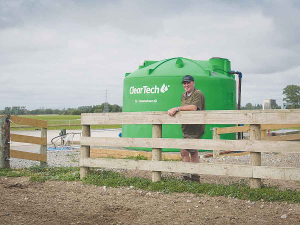Waikato dairy effluent breaches lead to $108,000 in fines
Two farmers and two farming companies were recently convicted and fined a total of $108,000 for environmental offending.
 Ravensdown’s ClearTech system uses a coagulant to bind colloidal particles together to settle them out from the water.
Ravensdown’s ClearTech system uses a coagulant to bind colloidal particles together to settle them out from the water.
For South Canterbury dairy farmers Neil and Margaret Campbell, installing a ClearTech effluent treatment system has yielded a wide range of positive impacts on their 240ha farm.
Thorneycroft, an 800-cow property near Geraldine, borders the water collection zone for the township. It was while working with Ravensdown Environmental to renew his farm consents that Neil says the idea of installing a ClearTech unit came about.
“The science was a plus with the information we were putting together with our consents to farm, which is why we pursued the ClearTech system for that particular farm,” he says.
Developed in conjunction with Lincoln University, Ravensdown’s ClearTech system uses a coagulant to bind colloidal particles together to settle them out from the water. This clarifying process reduces the environmental and safety risks linked with farm dairy effluent (FDE). It kills 99% of E. coli bacteria in the clarified water and reduces the risk of phosphorus leaching in the FDE applied to pasture.
Stripping out the E. coli and other bacteria in FDE means freshwater use is reduced, while effluent storage capability is increased. The clarified water is used to wash down the dairy yard and irrigated back onto paddocks.
By reducing the amount of FDE by around two-thirds, ClearTech offers Neil a proactive solution to the environmental issue of spreading effluent to pasture near the township.
He’s also noted better water conservation and increased time efficiencies for staff on-farm, particularly with their travelling irrigator system for effluent spreading.
“The less material we have to spread with that, the less labour is required,” he notes.
Neil’s seen firsthand how much easier it has made things for the staff on Thorneycroft, and his advice for anyone thinking about ClearTech is to ‘go for it’.
“There are so many positives with it and the science is all there behind it.”
Agrisea NZ has appointed Craig Hudson as it's new chief growth officer.
State farmer Landcorp, trading as Pamu, is a forecasting a full-year net profit of around $100 million.
Tony Aitken, chief executive of Ruralco, has been awarded the Excellence in Business Leadership Award at the ANZ Business of the Year Awards.
Global trade has been thrown into another bout of uncertainty following the overnight ruling by US Supreme Court, striking down President Donald Trump's decision to impose additional tariffs on trading partners.
Controls on the movement of fruit and vegetables in the Auckland suburb of Mt Roskill have been lifted.
Fonterra farmer shareholders and unit holders are in line for another payment in April.